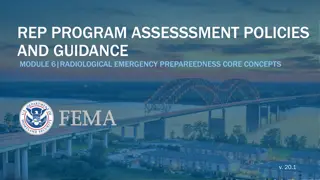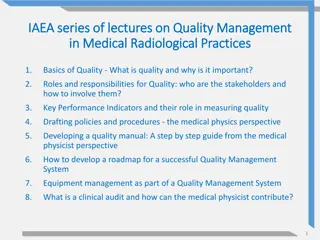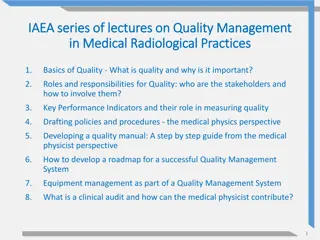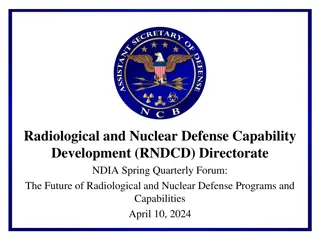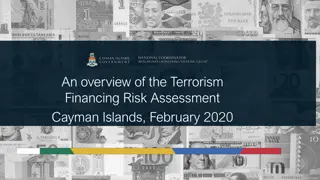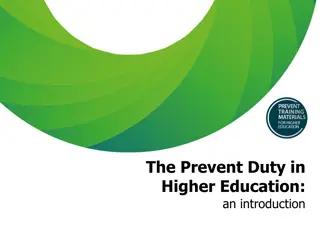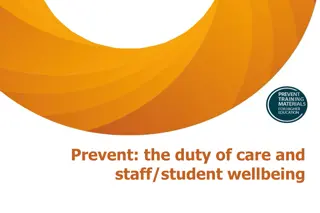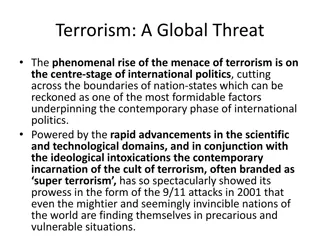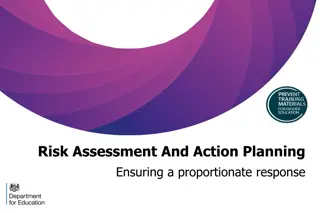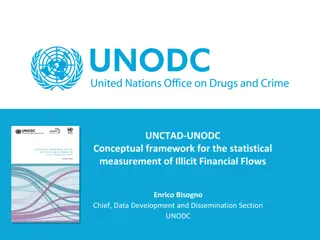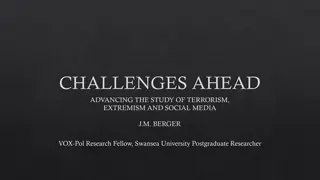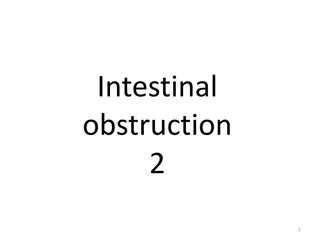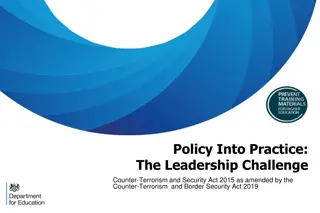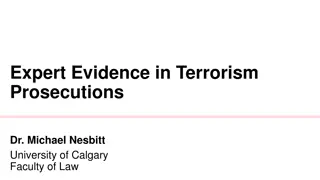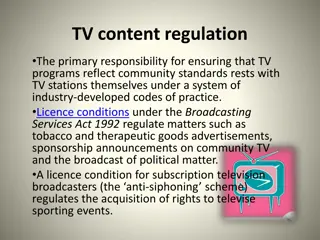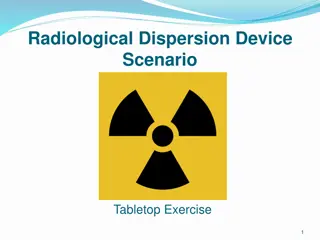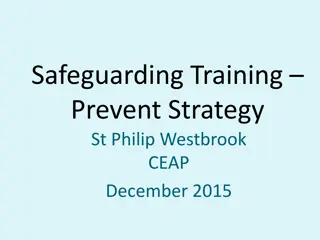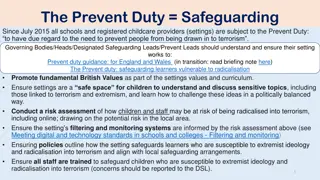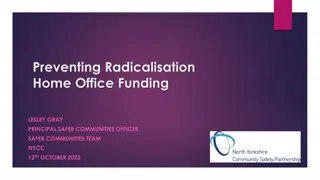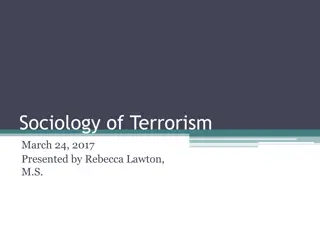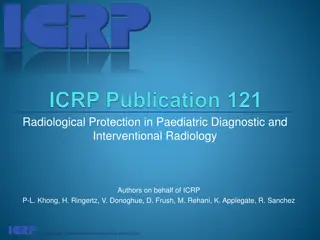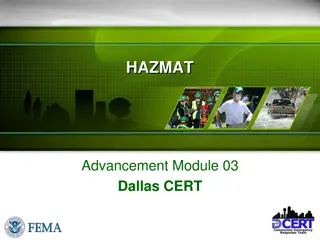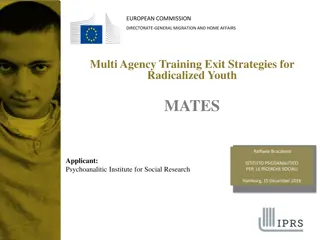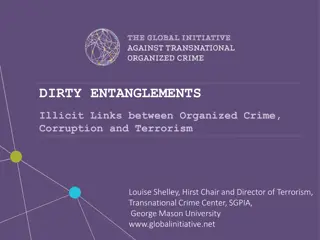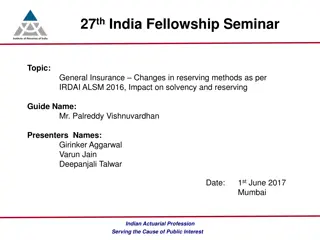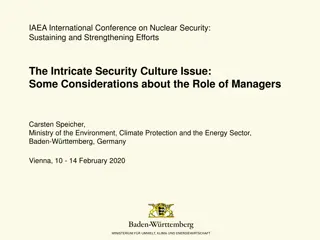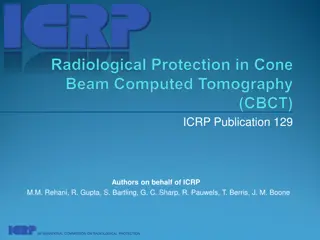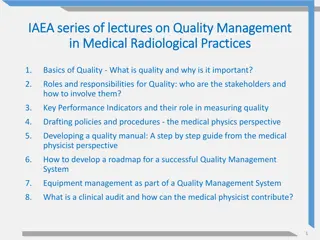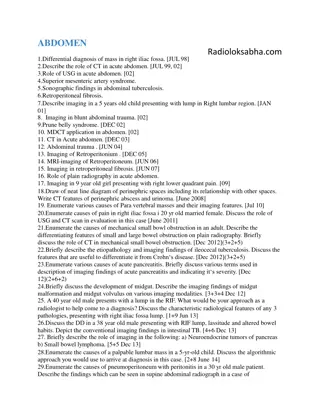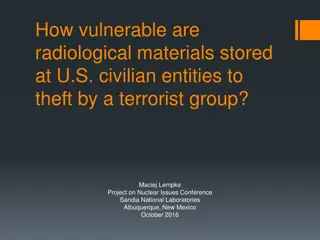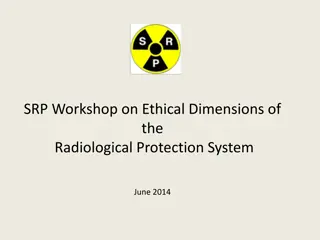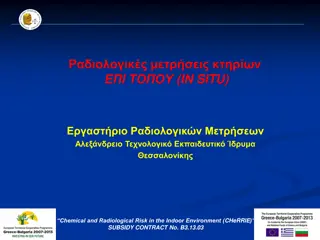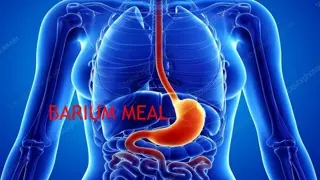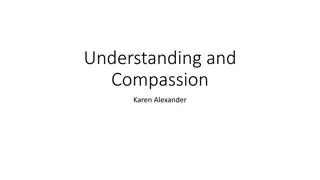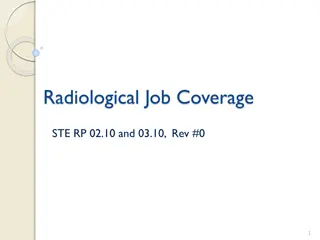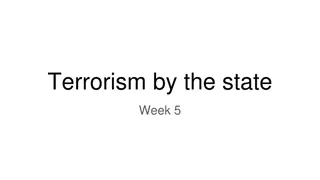Understanding Anti-Money Laundering (AML) and Combating Financing of Terrorism (CFT) Framework
Learn about the essential components of Anti-Money Laundering (AML) and Combating the Financing of Terrorism (CFT) framework, including regulatory obligations, objectives, money laundering processes, stages, sanctions, and regulatory overview. Discover how money laundering, terrorist financing, and
1 views • 30 slides
Radiological Emergency Preparedness Program Assessment Guidance
This module covers the assessment policies and guidance for radiological emergency preparedness programs. It includes key concepts such as metrics for program evaluation, FEMA's assurance determination process, specific demonstration requirements, capability targets, and critical tasks. Participants
4 views • 22 slides
IAEA series of lectures on Quality Management in Medical Radiological Practices
Quality management in medical radiological practices is crucial for ensuring the delivery of high-quality healthcare services. This series of lectures covers topics such as the basics of quality, roles and responsibilities, key performance indicators, drafting policies, developing a quality manual,
4 views • 54 slides
Comprehensive Insights into Quality Management in Medical Radiological Practices
Explore a series of lectures by the IAEA focusing on quality management in medical radiological practices, covering essential topics such as the basics of quality, key performance indicators, drafting policies, equipment management, and more. Gain a thorough understanding of KPIs, their significance
0 views • 48 slides
Future of Radiological and Nuclear Defense Programs and Capabilities
The Radiological and Nuclear Defense Capability Development Directorate discusses the responsibility for modernizing and procuring defense capabilities in the face of radiological and nuclear threats. The Department of Defense outlines strategic priorities to ensure the ability to survive and prevai
1 views • 10 slides
Terrorism Financing Risk Assessment in Cayman Islands (February 2020)
The Terrorism Financing Risk Assessment in Cayman Islands, conducted in February 2020, analyzed data on cross-border fund flows, trade statistics, intelligence on terrorism financing, and more. The assessment identified high-risk jurisdictions and utilized the FATF's guidance to assess risks related
2 views • 16 slides
Understanding the Prevent Duty in Higher Education
This introduction module provides essential information on the Prevent Duty in higher education, outlining its statutory requirements and objectives. It covers topics such as the Counter-Terrorism and Security Act 2015, the process of radicalization, and strategies to prevent individuals from being
0 views • 37 slides
Understanding Prevent Duty in Higher Education: Care, Wellbeing & Support
The Prevent duty in higher education requires specified authorities to prevent individuals from being drawn into terrorism. Alongside duty of care, institutions must safeguard staff and student wellbeing while identifying and supporting at-risk students. Effective pastoral care and policies for pray
2 views • 25 slides
Terrorism: A Global Threat in International Politics
The rise of terrorism as a global menace is a significant factor in contemporary international politics. Fueled by advancements in technology and ideology, terrorism poses a formidable challenge, exemplified by events like the 9/11 attacks. Efforts are needed to combat terrorism on both national and
0 views • 24 slides
Effective Strategies for Preventing Terrorism: Risk Assessment and Action Planning
Counter-Terrorism and Security Act 2015 mandates Higher Education providers to conduct risk assessments to prevent students from being drawn into terrorism. Understanding the law and compliance requirements is crucial, followed by developing a thorough action plan driven by risk analysis. The plan s
0 views • 21 slides
Understanding Illicit Financial Flows and Their Implications
This content delves into the conceptual framework for measuring Illicit Financial Flows (IFFs), highlighting how IFFs intersect with various policy agendas such as tax evasion, corruption, and terrorism financing. It also emphasizes the importance of addressing IFFs for sustainable development, peac
1 views • 10 slides
Advancing Research on Terrorism, Extremism, and Social Media Challenges
Delve into the complexities of terrorism and extremism studies, uncovering the nuances between violent extremism and terrorism, challenging existing definitions, and exploring the evolving fields in the realm of social media. The discourse navigates the shifting focus, the definitions of terrorism a
0 views • 9 slides
Radiological Features and Clinical Presentations of Intestinal Obstruction
Intestinal obstruction can manifest with various clinical features such as sudden severe pain, tenderness, fever, and more. Imaging plays a crucial role in diagnosing obstruction, with X-rays showing characteristic findings in the small bowel and colon. Different types of obstructions like strangula
0 views • 43 slides
Leadership Responsibilities in Counter-Terrorism Policies
Leadership roles under the Counter-Terrorism and Security Act involve establishing mechanisms to understand radicalization risks, ensuring staff capabilities to address these risks, promoting duty importance, and maintaining effective policy implementation. Governing bodies must provide annual assur
0 views • 16 slides
Analysis of Expert Evidence in Terrorism Prosecutions
The data presented highlights statistics on resolved terrorism prosecutions, including conviction rates, gender proportions, involvement of experts, categories of expert evidence, and the treatment of experts by judges. The analysis includes details on the types of expert evidence used, appearances
4 views • 10 slides
Television Content Regulation in Australia
Television content regulation in Australia is overseen by industry-developed codes of practice and specific licence conditions under the Broadcasting Services Act 1992. TV stations hold the primary responsibility to ensure that programs reflect community standards. Regulations cover areas such as to
0 views • 12 slides
Radiological Dispersion Device Tabletop Exercise Overview
This tabletop exercise focuses on simulating a radiological dispersion device scenario to enhance emergency response readiness and assess response plans. The exercise includes agenda discussions, administrative details review, scenario analysis, facilitated discussions, action planning sessions, and
0 views • 32 slides
PREVENT Strategy Implementation in Sheffield Schools: Autumn/Winter 2015-16
Raising awareness of the PREVENT strategy in Sheffield schools during the Autumn/Winter term of 2015-16 is crucial for safeguarding and preventing individuals from supporting terrorism. The strategy emphasizes the duty of schools to address all forms of terrorism through various initiatives like wor
0 views • 16 slides
Understanding the Prevent Duty in Safeguarding Training at St. Philip Westbrook CEAP
In the Prevent Strategy training session at St. Philip Westbrook CEAP in December 2015, participants were educated on the Prevent duty outlined in the Counter-Terrorism and Security Act 2015. The session aimed to clarify the responsibilities of schools and childcare providers in preventing individua
0 views • 25 slides
Safeguarding Against Terrorism: The Prevent Duty in Education Settings
Since July 2015, schools and childcare providers must comply with the Prevent Duty to prevent individuals from being radicalized into terrorism. This duty involves promoting British values, conducting risk assessments, training staff, and making referrals when necessary. Prevent training is essentia
0 views • 7 slides
Understanding Prevent Duty Guidance in the UK Education Sector
Statutory guidance under the Counter Terrorism and Security Act 2015 outlines the Prevent Duty, requiring authorities to prevent individuals from being drawn into terrorism. The guidance specifies responsibilities for various sectors, including local authorities, police, education, health, and crimi
0 views • 50 slides
Enhancing Counter Terrorism Efforts Through Community Partnerships
The Prevent CSO Strategy focuses on aligning partnerships with Counter Terrorism objectives to address radicalization causes and provide early interventions. A new Funding Model administered by Groundwork aims to empower Local Authorities to bid for Prevent projects. The Counter Terrorism Local Prof
0 views • 8 slides
Sociology of Terrorism: Understanding the Dynamics and Impacts
Delve into the intricate world of terrorism with a focus on analysis, identification, and stages leading to radical actions. Explore the social, political, and historical context behind terrorism, emphasizing the importance of understanding individual perpetrators. Uncover the complexities of justif
0 views • 38 slides
Radiological Protection in Paediatric Diagnostic and Interventional Radiology
Radiological protection in paediatric diagnostic and interventional radiology is crucial due to the higher risk per unit of radiation dose for infants and children compared to adults. The justification for using radiological examinations should prioritize patient benefits, with emphasis on optimizat
0 views • 36 slides
HAZMAT and Terrorism Response Protocols
This module covers HAZMAT awareness, safety protocols, and CERT tasks in dealing with hazardous materials incidents. It also provides guidance on recognizing and responding to potential terrorism incidents. Key topics include using the Emergency Response Guidebook, CERT team responsibilities, victim
0 views • 57 slides
Multi-Agency Training for Radicalized Youth: Defeating Terrorism through Desensitization
This project, led by the European Commission, aims to combat radicalization and terrorism by implementing multi-agency training programs focused on social reintegration, prevention of recruitment, and increasing motivation among young individuals. Partnering with several universities and organizatio
0 views • 20 slides
Understanding Extremist Risks: Insights and Strategies
Explore the complexities of extremist risk through a lens of psychological and contextual analysis. Delve into the nature of terrorism, different types of terrorism, and the importance of robust risk assessment in preventing, pursuing, protecting, and preparing against terrorist activities.
0 views • 21 slides
The Interplay of Organized Crime, Corruption, and Terrorism
Complex interconnections exist between organized crime, corruption, and terrorism, with almost all terrorist groups funded by criminal activities. These illicit ties create challenges for regional and global stability, undermining development opportunities. The United Nations has recognized the link
0 views • 12 slides
Challenges in Pricing Cyber Risk and Terrorism Risk: Impact on Solvency and Reserving Methods
The seminar discusses the challenges in pricing cyber risk and terrorism risk, with a focus on changes in reserving methods as per IRDAI ALSM 2016 and their impact on solvency and reserving. Key areas of consideration under ALSM 2016, valuation of assets, estimation of liabilities, and more are cove
0 views • 21 slides
Nuclear Security Culture and Managerial Role: Insights from IAEA Conference
Exploring the concept of security culture in nuclear facilities, this presentation by Carsten Speicher at the IAEA International Conference on Nuclear Security delves into the role of managers in fostering a positive security culture. It discusses the risks posed by radiological terrorists and the p
0 views • 16 slides
Understanding Radiation Safety in Cone Beam CT Imaging
Cone Beam CT (CBCT) technology has revolutionized imaging in various medical fields, presenting unique radiological protection challenges. This summary highlights the importance of optimizing radiological protection for patients and workers using CBCT, emphasizing the need for informed decision-maki
0 views • 24 slides
Effective Equipment Management in Medical Radiological Practices
This presentation focuses on key aspects of managing medical equipment within a Quality Management System in radiological practices. It covers topics such as the importance of quality, roles and responsibilities, equipment procurement procedures, and developing a successful Equipment Management Syst
0 views • 32 slides
Comprehensive Radiological Imaging Review in Abdominal and Adrenal Pathologies
This extensive radiological imaging review covers a wide range of topics in abdominal and adrenal pathologies, discussing differential diagnoses, imaging modalities such as CT and USG, specific syndromes like prune belly syndrome, and conditions like retroperitoneal fibrosis. It delves into various
0 views • 39 slides
Vulnerability of Radiological Materials to Theft by Terrorist Groups in US Civilian Entities
The vulnerability of radiological materials stored at US civilian entities to theft by terrorist groups, particularly low-activity sources, remains a significant concern. Security measures primarily focus on high-activity sources, leaving lower activity sources neglected and highly susceptible to ex
0 views • 16 slides
Workshop on Ethical Dimensions of Radiological Protection System
This workshop focuses on exploring the ethical values within the radiological protection system, addressing practical implementation aspects that raise ethical questions. It aims to improve understanding, communication, and management of radiation risk, building on previous workshops' outcomes. The
0 views • 10 slides
Indoor Chemical and Radiological Risk Monitoring Study
The (IN.SITU) Chemical and Radiological Risk in the Indoor Environment (CHeRRIE) study conducted measurements of radon concentrations and e-perm levels in indoor environments from Oct. 2014 to March 2015. The findings show variations in radon and e-perm levels at different times of the day and acros
0 views • 14 slides
Understanding Barium Meal Radiological Study
Barium meal is a radiological study of the upper gastrointestinal tract, including the esophagus, stomach, duodenum, and proximal jejunum. It helps diagnose various conditions such as peptic ulcers, cancers, and gastrointestinal obstructions. The procedure involves oral administration of barium cont
0 views • 11 slides
Understanding Social Progress and Terrorism: Factors and Solutions
Exploring the socio-economic factors contributing to terrorism and hindering social progress, this content delves into the correlation between unemployment, state repression, violence, and terrorism. Key factors analyzed include weak state capacity, corruption, extremist ideologies, and social injus
0 views • 15 slides
Radiological Job Coverage and Operating Experience Review
Explore the importance of proper job coverage in radiological tasks, focusing on a specific incident involving workers entering the wrong location inside a high radiation area. Learn valuable lessons on following procedures, training, and maintaining continuous job coverage to ensure safety. Underst
0 views • 139 slides
Understanding State Terrorism and Its Implications on Society
State terrorism, employed by governments or factions within them, poses a grave threat to citizens and international peace. This form of terrorism includes intimidation, coerced conversion, and genocide as tools to maintain control. Dictators find it easier to carry out state terrorism in secret, of
0 views • 7 slides

